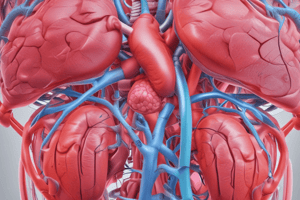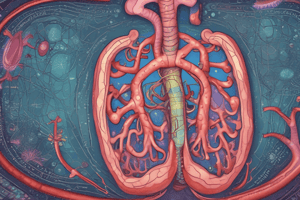Podcast
Questions and Answers
What does anatomy primarily focus on?
What does anatomy primarily focus on?
- The structure of internal organs (correct)
- The identification of diseases
- The functions of organ systems
- The study of cells and tissues
Which type of anatomy involves studying structures without the aid of a microscope?
Which type of anatomy involves studying structures without the aid of a microscope?
- Gross anatomy (correct)
- Comparative anatomy
- Microscopic anatomy
- Pathological anatomy
What is the other name for microscopic anatomy?
What is the other name for microscopic anatomy?
- Histology (correct)
- Systematic anatomy
- Regional anatomy
- Organology
In the context of anatomy, what is critical when determining the treatment for a patient?
In the context of anatomy, what is critical when determining the treatment for a patient?
When studying the thorax, which structures are typically examined?
When studying the thorax, which structures are typically examined?
Which of these statements about the practice of medicine is true regarding anatomy?
Which of these statements about the practice of medicine is true regarding anatomy?
What should be verified regarding any pharmaceutical product before administration?
What should be verified regarding any pharmaceutical product before administration?
What type of ultrasound is most commonly used to assess the genital tract in women?
What type of ultrasound is most commonly used to assess the genital tract in women?
What solely defines the region of study when examining anatomy?
What solely defines the region of study when examining anatomy?
What does a CT scanner use to obtain images of the body?
What does a CT scanner use to obtain images of the body?
Which imaging method is preferred for assessing prostate conditions in men?
Which imaging method is preferred for assessing prostate conditions in men?
What principle primarily underlies magnetic resonance imaging (MRI)?
What principle primarily underlies magnetic resonance imaging (MRI)?
What is the role of radio waves in the MRI process?
What is the role of radio waves in the MRI process?
Which of the following correctly describes the first use of nuclear magnetic resonance imaging?
Which of the following correctly describes the first use of nuclear magnetic resonance imaging?
What is responsible for producing the final image in a CT scanner?
What is responsible for producing the final image in a CT scanner?
What aspect of biological tissues makes protons ideal for use in MRI?
What aspect of biological tissues makes protons ideal for use in MRI?
What structure is typically found between the synovial membrane and the joint capsule?
What structure is typically found between the synovial membrane and the joint capsule?
Which of the following structures is specifically associated with the protection and lubrication of synovial joints?
Which of the following structures is specifically associated with the protection and lubrication of synovial joints?
What type of cartilage is typically found covering the ends of bones at synovial joints?
What type of cartilage is typically found covering the ends of bones at synovial joints?
Which of the following is NOT considered an accessory structure of synovial joints?
Which of the following is NOT considered an accessory structure of synovial joints?
What is the primary function of the synovial membrane in a synovial joint?
What is the primary function of the synovial membrane in a synovial joint?
In which type of synovial joint could you find two sets of contact points during movement?
In which type of synovial joint could you find two sets of contact points during movement?
Which component of a synovial joint acts to cushion the joint and absorb shock?
Which component of a synovial joint acts to cushion the joint and absorb shock?
What is the primary purpose of the fibrous membrane in a synovial joint?
What is the primary purpose of the fibrous membrane in a synovial joint?
What is the function of the periosteum?
What is the function of the periosteum?
What happens if a bone is stripped of its periosteum?
What happens if a bone is stripped of its periosteum?
At what age does skeletal maturity typically occur in western countries?
At what age does skeletal maturity typically occur in western countries?
Which method is typically used to assess bone age?
Which method is typically used to assess bone age?
What may cause a slow bony maturity?
What may cause a slow bony maturity?
How is skeletal maturity determined?
How is skeletal maturity determined?
In which type of ossification do cartilaginous models of bones form from mesenchyme?
In which type of ossification do cartilaginous models of bones form from mesenchyme?
Which factor is NOT listed as influencing skeletal maturity?
Which factor is NOT listed as influencing skeletal maturity?
What distinguishes T1-weighted images from T2-weighted images?
What distinguishes T1-weighted images from T2-weighted images?
In diffusion-weighted imaging, what does the degree of Brownian motion indicate?
In diffusion-weighted imaging, what does the degree of Brownian motion indicate?
How are gamma rays and X-rays differentiated in terms of their production?
How are gamma rays and X-rays differentiated in terms of their production?
What does a T1-weighted MRI image typically show for cerebrospinal fluid (CSF)?
What does a T1-weighted MRI image typically show for cerebrospinal fluid (CSF)?
What is the effect of intracellular water molecules in tumors regarding diffusion?
What is the effect of intracellular water molecules in tumors regarding diffusion?
What aspect of tissue does diffusion-weighted imaging provide insight into?
What aspect of tissue does diffusion-weighted imaging provide insight into?
What does T2-weighted imaging highlight in terms of fat signal?
What does T2-weighted imaging highlight in terms of fat signal?
Which advantage does MRI have regarding blood flow assessment?
Which advantage does MRI have regarding blood flow assessment?
Flashcards are hidden until you start studying
Study Notes
The Body and Anatomy
- The body is studied in various ways, including through gross and microscopic anatomy.
- Gross anatomy examines structures visible without magnification, while microscopic anatomy (histology) uses microscopes to study cells and tissues.
- Anatomy is essential for medical practices.
Imaging Techniques
- Ultrasound is commonly used for imaging the abdomen, fetus, eyes, neck, soft tissues, and musculoskeletal system.
- Endoluminal ultrasound is used for assessing the esophagus, stomach, and duodenum.
- Transvaginal or transrectal ultrasound is used for assessing the genital tract in women.
- Transrectal ultrasound is used for analyzing the prostate in men.
- Computed tomography (CT) scanning uses X-rays to obtain images of the body in the axial plane.
- The CT scanner produces a series of images (slices) by rotating an X-ray tube around the patient.
- A computer analyzes these images to create a comprehensive image.
- Magnetic resonance imaging (MRI) relies on the hydrogen nuclei (protons) in water molecules, which are abundant in biological tissues.
- The patient is placed in a strong magnetic field that aligns the protons, and radio waves are used to disrupt this alignment.
- As the protons return to their aligned state, they emit radio pulses, which are analyzed to produce an image.
- Different pulse sequences and parameters allow for T1 and T2 weighted images, which accentuate specific tissue characteristics.
- T1 weighted images typically show dark fluid and bright fat, while T2 weighted images show bright fluid and intermediate signal from fat.
- MRI can be used to assess blood flow in vessels and create angiograms.
- Diffusion-weighted imaging measures water molecule movement in tissues.
- Abnormal tissue, such as tumors and infarcted tissue, exhibit restricted diffusion due to increased intracellular fluid.
Bone Structure and Development
- Bones are covered externally by a fibrous connective tissue membrane called the periosteum, except at joints where articular cartilage is present.
- The periosteum contains blood vessels that supply the outer layers of compact bone and is essential for bone survival.
- Bones develop from mesenchyme via intramembranous or endochondral ossification.
- Intramembranous ossification involves direct ossification of mesenchymal models, while endochondral ossification involves ossification of cartilaginous models formed from mesenchyme.
Skeletal Age
- Skeletal maturity is typically reached between 20 and 25 years of age but can vary due to factors such as geography, socioeconomic conditions, genetics, and disease.
- Bony growth and development follow a predictable pattern until skeletal maturity.
- Skeletal age can be determined using ultrasound, plain radiographs, or MRI.
- The non-dominant (left) hand is typically radiographed and compared to standard radiographs to assess bone age.
- Conditions like malnutrition and hypothyroidism can slow down bony maturity.
- In healthy individuals, bone age accurately represents their true age, which can be important for determining age and in medicolegal contexts.
Synovial Joints
- Synovial joints are characterized by a joint capsule, synovial membrane, and articular cartilage.
- The synovial membrane produces synovial fluid, which lubricates the joint and provides nutrients to the cartilage.
- The joint capsule encloses the joint and is lined by the synovial membrane.
- Other accessory structures associated with synovial joints include tendons, ligaments, bursae, fat pads, and articular discs.
Studying That Suits You
Use AI to generate personalized quizzes and flashcards to suit your learning preferences.




